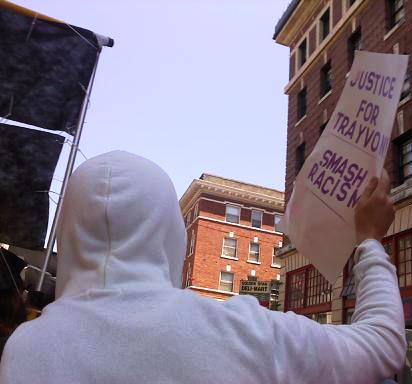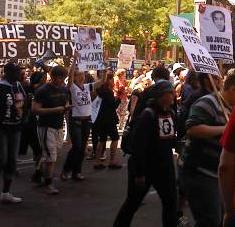When I posted last night about the rallies today for justice for Trayvon Martin around the country, I wasn’t sure whether I would actually go to one today myself or not. I mean, writing about it on the Internet is one thing, but actually showing up to march down city streets is quite another. And as someone raised in the suburbs, the idea of being a part of anything that might cause a stir or make waves automatically sets off this weird, reflexive panic alarm: oooo!!! weeee-oooo!!! Better to stay home! It shrieks. Better to keep your head down! Weee—ooo!!!!
In 2006, I saw a young black man from Michigan perform a spoken word poem about a march that neo-Nazis had staged in Lansing (the capitol of Michigan) earlier that year. The poem spoke directly to white college students. So many of you call yourselves anti-racist, he said. So many of you say you’re for racial equality. But, he asked, where were you that day in Lansing? Where were you when it came time to speak out in protest? The message of that poem has haunted me ever since. It’s true. It’s easy to talk a big talk — but when it comes to actually walking the walk, that reflexive panic alarm tends to win out among folks who have the privilege and ability to turn their backs. I thought of that poem this morning. And I thought of the names of all the people in my life who would disapprove if they knew I was going, all the people who “don’t believe” racism exists, who agree with the Zimmerman verdict, or who thinks it’s best not to “make waves.” And with absolute certainty, I immediately knew whose respect I would earn by going – my own —for having the integrity to really, actually stand up for something I believe in, regardless of what those people might think. And so, I put on my shoes, and I walked out the door.
And it was the right decision.
The nearest gathering to where I live was much smaller than I expected – maybe two hundred and fifty people. The crowd was a racially diverse one that included people of all ages – actually, there were even a few dogs that came! I got there an hour into the rally, but still got to hear some amazing — truly amazing — speeches, including some from a couple of ministers who brought everyone to their feet to drown their words in cheers and applause, an almost 80-year-old former Black Panther, a local high school teacher who spoke brilliantly about this case and injustice in this country, and a relative of Trayvon Martin who lives nearby. I’m not someone who cries easily, but I felt like I was about to break out some serious crying during several of these speeches.
When these were finished, we lined up on the street next to the federal building. And together we began to march.
Accompanied by some of our city’s police force – on bikes and in their cars – we marched over two miles together down the main streets of the city. These were streets I’ve been on many times – while riding in a car, or walking on the sidewalk. But this afternoon, we walked right down the middle, and there was something so incredible about that, and seeing all the traffic stopped, seeing fists of solidarity being raised out of windows as we walked by, just getting to be a part of all of it. By the end of the march, many of us (myself included) were covered in sweat and feeling tired (we live in a hilly place, so it wasn’t a flat 2+ miles), but we reached the end of our route still chanting and cheering.
Sometimes, when I’m talking to (white) friends about race, they seem to think racism ended with Dr. Martin Luther King, Jr, or that the concept of racism is some kind of thing made up by politicians to elicit sympathy for some ulterior motive. And on the issue of Trayvon Martin, most people I know stay completely silent. “I don’t know much about it,” they’ll say, and change the subject. More than anything else, what I took away from today’s rally/march was that, even though it was a small gathering, that there are still so many people who do want to talk about it, who do want to work together to build relationships and to help create change. And I left understanding that, whenever we’re ready to put on our shoes, there is a place where each of us can start, right now, to walk the walk.

